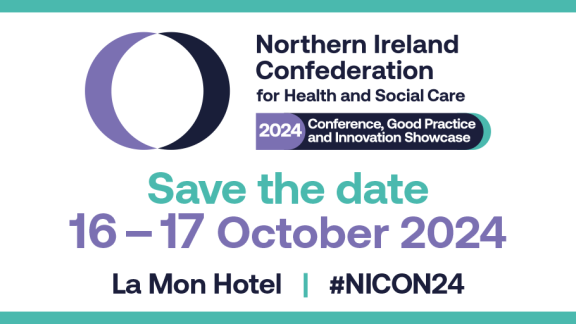Universal healthcare: This is my truth, tell me yours
Rob Webster, chief executive of West Yorkshire Integrated Care Board shared the values that underpin his work as a leader and referred to the founding principles of the NHS. He referenced the recent satisfaction statistics that show only 24 per cent of the public are satisfied with the NHS, however what the data shows is that people still believe in the NHS. NHS principles are still aligned to our values as a society.
Rob reminded the room that NHS leaders remain accountable to the public - all of them. Equality matters to everybody but that is not always visible. The country and system conspires to stop people fulfilling their potential. It is the duty of public sector organisations to stop that happening and for leaders to stop it happening on their watch. If we're going to do that we have to tackle the racism and inequalities in our society - because it's our job. That takes courage. We can do that by making talent visible, in the way that the BME Leadership Network does.
South Yorkshire and West Yorkshire Integrated Care Boards are doing the work, addressing concerns internally and having the difficult conversations. One action was to create an anti-racist movement within the system and to determine what that means really in collaboration with local organisations and the communities impacted.
“Improvement is not a straight line. Values drive this work. Courage and fortitude see it through.”
The legacy of Nye Bevan
What are the tangible outcomes for those of us impacted by racism? What has changed since the 80s?
Diverse leadership, by developing those that struggle to break through the glass ceiling. Diverse leadership also leads to different conversations which makes systems run differently, improving cultural competence and making tangible differences.
We have generations of oppression and racism to untangle. We need to continue to be skeptical and to ask what difference our actions are taking.
How do we quantify culture and measure a shift in attitudes and behaviours? What does change look like?
If you want to change behaviour, first you have to change minds. Fundamentally this requires leadership and a compelling story on why change matters. It needs constant attention - keep highlighting the message. You also cannot ignore the broader narrative around race currently in our society. Leaders have to constantly challenge that and make the case for anti-racism as improvement.
What does the evidence, data and standards tell us?
Fiona Edwards, chief executive at Frimley Health and Care highlighted that the core function of our job descriptions as leaders is to reduce health in equalities.
Dr Sam Roberts, chief executive of NICE opened by saying she speaks from a place of humility. NICE does not have all the answers and continues to grapple with issues of inequality. Starting from a stark place for staff - underrepresented BME staff and less likelihood of staff being appointed to senior roles. A position from which to improve. In 18 months NICE have halved the gap in representation of BME individuals in senior roles compared to the general population and increased the rate of successful BME candidates at interview.
Considerations - Are we following the evidence? Is the data reliable? Often people that take part in research are not representative of the general population so how do we make sure our evidence base reflects real life?
NICE has been pulling together the evidence across this issue while also prioritising urgent health inequalities issues for further research and evidence-gathering to support clinical recommendations ie, pulse oximetry for darker skin during COVID-19.
NICE factor in health inequalities into clinical guidelines but there is so much further to go to remove them - maternity services being a key example.
“Accountability lies at many layers - everyone, everywhere, all of the time. Collaboration is key.”
Truth from the frontline
Senior nurses shared moving personal stories to illustrate their truth from the frontline, including; witnessing internalised racism and patients in pain being ignored; direct barriers to career progression; and being up close and personal with health inequalities.
The benefit of their collective experience teaches us:
- The importance of co-producing with patients – who else can know what they’re feeling?
- To be tenacious and keep going, regardless – who else will pave the way?
- Representation is vital for embedding equity in policy, guidance and processes.
- To stand up for what we know is right – even (or especially) if it makes people uncomfortable.
Discrimination persists in education, recruitment and service delivery. These personal stories are true lessons from the frontline and they show us that not everyone shares our values. If we are to attain universality, we must endeavour to use our influence wherever we can, while being authentically ourselves, to show others that sometimes humility means putting everything down, admitting you were wrong and starting again.
A view from the outside
From her extensive experience of supporting leaders to be the best leaders they can be, at all levels, Karena Karena Starkie-Gomez, director, leadership and workforce at KPMG has identified six ways to create a diverse and inclusive workforce to deliver for patients:
- Make it personal; something you care about.
- Link to purpose/values and population health – find the true north and pursue it.
- Sponsor someone: lift as you climb.
- Be clear on the benefits of EDI – make the business case.
- Link to citizen outcomes – include citizens in design.
- Leadership accountability is key – formal and informal.
Keeping the promise: examples of theory and practice
Cllr Dr Jacqui Dyer and Dr Shera Chok shared their personal journeys, shaping frameworks in digital technology and mental health to benefit racialised communities. Dr Chok emphasised the profound effects of the lack of diversity in digital technology on NHS procurement, prompting her to establish The Shuri Network. This network mentors BME women, enabling them to excel in digital roles within the NHS.
Cllr Dr Jacqui Dyer discussed the Patient and Carer Race Equality Framework (PCREF), aimed at enhancing care for racialised communities in mental health. PCREF comprises leadership and accountability, national competencies and patient and carer feedback mechanisms. Their collective efforts underscore the positive outcomes achievable by addressing inequalities alongside racialised communities.
How to do anti-racist leadership - senior leadership
After reflecting on the sessions and discussions, the panel opened the floor to the audience for sharing. Each panellist offered insights into sustaining anti-racist efforts and acknowledged the challenges inherent in this endeavor. As the audience chimed in, they recounted their own experiences combatting health disparities within their respective roles and organisations. Despite a shared determination to persist in the fight against racism within the NHS, it was evident that greater accountability and concerted efforts were necessary to tackle racial inequities affecting both staff and patients. The panel concluded with a unanimous commitment from all present to continue the work ahead.

















